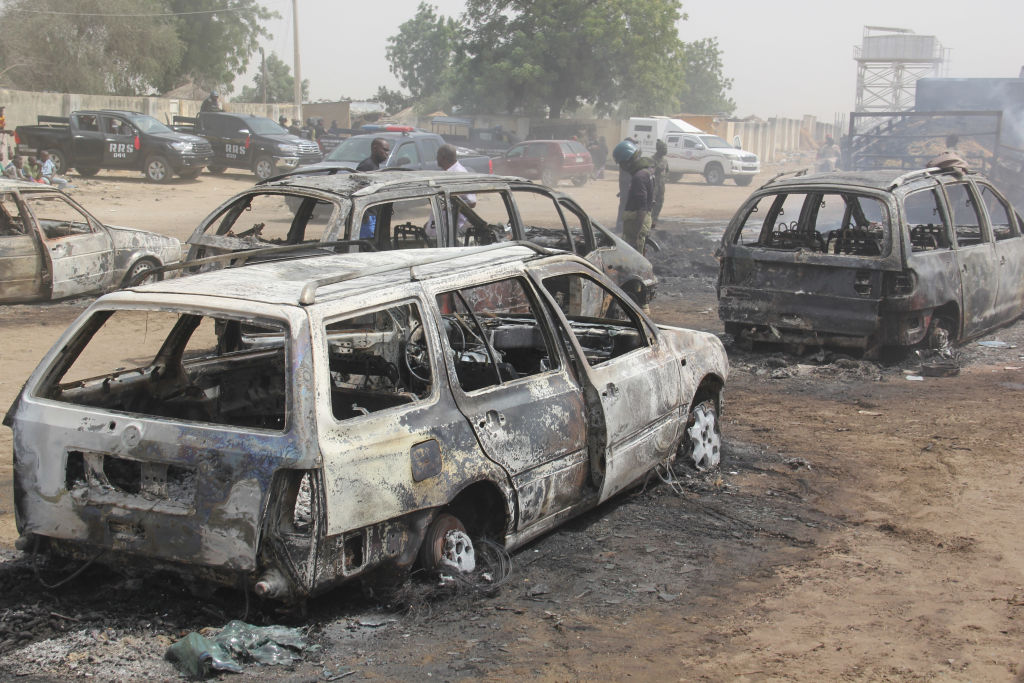The Islamic State West Africa Province terror group is waging war on remote military outposts in the Lake Chad region. The Institute for Security Studies recorded at least 15 ISWAP attacks in border zones this year.
The bases targeted in the attacks were established to stabilize affected areas and allow displaced civilians to safely return home.
A Boko Haram offshoot, ISWAP has demonstrated an evolution in its tactics during a campaign it calls Camp Holocaust. In early May, ISWAP fighters on motorcycles raided a Nigerian Army “supercamp” in Buni Gari in northeastern Yobe State; for years, the terror group relied heavily on pickups and improvised up-armored carriers, which are similar to a Humvee. Four Nigerian Soldiers were killed in the attack.
“Supercamps” are a Nigerian strategy where smaller camps are closed and replaced with fewer, larger, well-constructed military strongholds with a capacity for “swift mobility.”
“Overall, the use of motorcycles in attacks suggests that ISWAP is starting to pivot toward lightning assaults, attempting to overwhelm a given supercamp’s defenses before disappearing back out into the surrounding area to avoid retaliation,” analyst Jacob Zenn wrote for The Jamestown Foundation. “This tactical evolution may ultimately be part of what breaks ISWAP’s current stalemate with Nigerian forces.”
Although Mohammed Idris, Nigeria’s minister for information, has claimed that ISWAP and other terror organizations are nearly defeated, ISWAP has found repeated success by increasingly attacking supercamps by using modified commercial drones during nighttime raids. It isolates bases by detonating nearby roads and bridges and has seized a stockpile of weapons from government forces, according to the Soufan Center.
Wave of Complex Attacks
The Buni Gari attack was one of a series of complex operations targeting the Nigerian military in May. On May 11, ISWAP overran the 50 Task Force Battalion in New Marte, Borno State. Attackers stole ammunition and at least 45 vehicles, abducted Soldiers and destroyed key military assets. Over the next two days in Borno, it launched nearly simultaneous assaults on remote bases in Dikwa, New Marte and Rann, as well as critical road infrastructure such as the Damboa-Maiduguri corridor. The remote bases were exposed due to a lack of infrastructure and services.
“This string of violence caused thousands to flee,” Soufan Center analysts wrote. “Moreover, disruption of this key supply route could facilitate ISWAP’s efforts to assert dominance over southern Borno.”
Military reinforcements often arrive at the outposts too late due to their remoteness and limited resources. One of ISWAP’s most devastating attacks unfolded in January, when it attacked Nigeria’s 149 Battalion in Malam Fatori on the Niger border. At least 20 Soldiers were killed, including the commander.
“Survivors said the fight lasted three hours, but no reinforcement came — neither from nearby units nor via air support, allowing the insurgents to strip the base of arms,” wrote Taiwo Adebayo, an Institute researcher who studies the Lake Chad Basin. He said that simply establishing more military outposts is an insufficient strategy and suggested establishing bases closer together to enable quick reinforcement. These bases must be well-resourced and rapidly mobile, with sufficient deployments of troops and equipment, he added.
Geography also complicates efforts to counter the group. Lake Chad’s islands, swamps and porous borders offer natural cover and operational flexibility, and the governments of Chad, Cameroon, Niger and Nigeria have ceded much of this territory. Adebayo called on governments to strengthen and expand their amphibious capabilities and suggested that the Multinational Joint Task Force’s naval units could disrupt militants’ activities and their command centers.
Recent ISWAP defectors involved in a government deradicalization program in Nigeria said the group’s tactical prowess had been aided by at least six trainers from the Middle East deployed by the Islamic State group.
Establishing a Caliphate
In parts of northeastern Nigeria and the Lake Chad region, ISWAP claims it has established a so-called caliphate. According to Malik Samuel, senior researcher at Good Governance Africa, it has established formal departments that oversee military operations, taxation, religious enforcement, justice and public welfare. Presenting itself as a credible alternative to the Nigerian government, ISWAP provides basic services in areas it controls and earns $191 million a year from taxes — 10 times more than the Borno State government. Most of its taxes are levied on artisanal fishermen and livestock owners on Lake Chad’s many islands.
“By carrying out governance activities, ISWAP demonstrates how jihadist organizations attempt to legitimize themselves before the people, making it easier to recruit and generate revenue, while simultaneously making it harder for the government to uproot them,” Samuel wrote for The New Humanitarian.
The group also earns money from kidnappings and from the IS group for equipment it captures from the Nigerian military.

